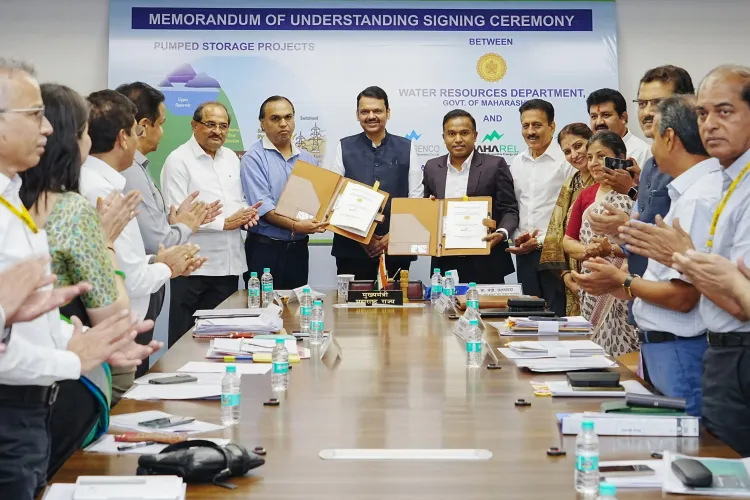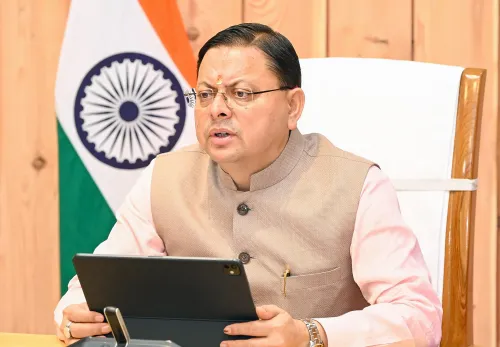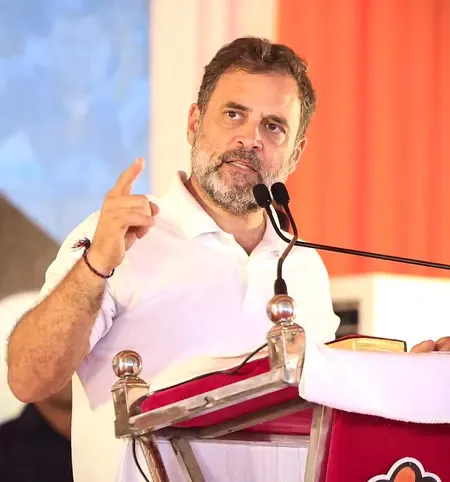Has Maharashtra Secured Rs 57,260 Crore for Hydro Power Projects?

Synopsis
Key Takeaways
- Maharashtra signs agreements for Rs 57,260 crore investment.
- Pumped storage hydropower projects to generate 8,905 MW.
- Over 9,200 jobs expected from these projects.
- Collaboration between public and private sectors emphasized.
- Focus on sustainable and green energy generation.
Mumbai, April 29 (NationPress) – The Maharashtra Water Resources Department, Maharashtra State Power Generation Corporation Ltd. (MAHAGENCO), Mahagenco Renewable Energy Limited (MREL), and Avaada Aqua Batteries have entered into three memorandums of understanding (MoUs) on Tuesday for a significant investment of Rs 57,260 crore. This funding aims to establish pumped storage hydropower projects across nine locations, capable of generating 8,905 MW.
These agreements were made in the presence of the Chief Minister and Energy Minister of Maharashtra, Devendra Fadnavis.
It is projected that these initiatives will create 9,200 job opportunities.
The MoUs encompass pumped storage projects with the Water Resources Department and MAHAGENCO, contributing to a capacity of 3,145 MW, alongside 2,110 MW through Mahagenco Renewable Energy Limited and 3,650 MW through Avaada Aqua Batteries.
MAHAGENCO is set to establish projects of 125 MW at Ghatghar, 220 MW at Kodali, 1,200 MW at Varasgaon, and 1,600 MW at Panshet.
Additionally, Mahagenco Renewable Energy Limited will implement projects of 110 MW at Mutkhed, 1,200 MW at Nive, and 800 MW at Varandaghat.
Avaada Aqua Batteries will contribute with projects of 2,400 MW capacity at Pawana Falyan and 1,250 MW at Sirsala.
Chief Minister Fadnavis stated, "The state is paving the way to achieve self-sufficiency in energy generation. The government's focus on pumped hydropower projects aims to enhance Maharashtra's energy resources while promoting green energy. The MoUs signed will position Maharashtra as a leader in pumped hydropower projects."
He instructed relevant agencies to expedite the progress of energy sector projects within the stipulated timeline.
CM Fadnavis emphasized that pumped hydropower is an innovative technology within the non-conventional energy sphere.
These projects are designed to meet the increasing electricity demands in agriculture, industry, and commercial sectors while contributing to environmental protection through sustainable and green energy generation.
The government has set a target to generate 50% of the state’s total energy through non-conventional sources, with planning and execution already underway.
The state has released a comprehensive policy to encourage pumped hydropower generation projects with private sector involvement, Fadnavis added.
Pumped storage hydropower (PSP) offers numerous advantages to the grid, including frequency regulation, phase modulation, reactive power compensation, incidental backup, and black start capabilities. Furthermore, PSP is an effective tool for managing peak load demands.
It utilizes energy during off-peak hours and generates power during peak periods, aiding in the stabilization of renewable energy sources for seamless grid integration.
Through ancillary services, it assists in managing the grid's reactive power needs, thereby supporting system voltage management.









